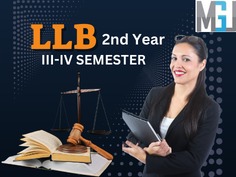What you’ll acquire:
- Acquire an in-depth understanding of core modules pertaining to legal frameworks and standards.
- Grasp the foundational and advanced principles of the LLB.
- Enhance analytical skills to dissect complex legal issues and formulate cohesive arguments through the application of legal theories and doctrines.
- Prepare comprehensively for the bar exam or other legal examinations through a well-structured curriculum and focused study materials.
Ready for law? Here's what you need!
- Fundamental knowledge of jurisprudence concepts
- A proactive attitude toward understanding legal frameworks
- Competency in critical analysis and reasoning
- Proficiency in verbal and written communication
- A keen interest in societal structures and norms
- Commitment to ethical practices and integrity in the field of law
Description:
Greetings! Everyone, I am honored to be your guide on this enlightening journey through the complexities of the law. This course has been meticulously designed to provide an in-depth understanding and mastery of various branches of law, offering valuable insights and materials to accelerate your learning curve.
Who can benefit from this course?
Whether you're an aspiring legal professional embarking on your LLB journey, gearing up for your exams, or an enthusiast keen to unravel the world of law, the LLB caters to a wide spectrum of learners. We cover a well-rounded curriculum that encapsulates both traditional and contemporary branches of law, designed to give you a holistic perspective.
Comprehensive curriculum featuring: LLB
Administrative law: The legal framework that governs government agencies' operations and decisions, ensuring transparency, accountability, and fairness in administrative processes, regulatory actions, and public policy implementation. It addresses disputes between individuals and government entities, safeguarding citizens' rights in interactions with administrative bodies.
Human Rights and International Law: A legal field dedicated to establishing and safeguarding universal human rights standards at the international level, ensuring that nations adhere to principles of justice, equality, and dignity in their interactions with each other and their treatment of individuals. It encompasses treaties, conventions, and organizations that aim to protect human rights globally and hold states accountable for violations.
India Legal and Constitutional History: The evolution of its legal system, including ancient codes, colonial influence, and the development of the modern Indian Constitution, shaping the nation's legal framework and governance structure. It reflects the diverse historical and cultural influences that have contributed to India's unique legal heritage
Jurisprudence: The philosophical study of the fundamental principles and theories that underlie the practice of law, exploring concepts of justice, rights, and the nature of law itself. It seeks to analyze, critique, and interpret the legal system, helping to shape legal thinking and decision-making.
Law Relating to Transfer of Property & Law of Easement: The legal aspects of transferring property rights, including buying, selling, and gifting real estate, while the Law of Easement deals with the rights of one party to use another's property for specific purposes, such as a right of way or access. Both areas of law establish rules and regulations to ensure clarity and fairness in property transactions and land use.
Professional Ethics in Accountancy for Law: Involves a set of moral and ethical standards guiding accountants and financial professionals in their legal and financial practices, emphasizing honesty, integrity, and compliance with laws and regulations to maintain public trust and financial transparency. It plays a vital role in upholding the credibility and ethical conduct of financial professionals within the legal and business sectors.
Civil Procedure Code And Limitation Act: The Civil Procedure Code outlines the procedural rules and processes for civil litigation in India, covering aspects like jurisdiction, pleadings, evidence, and appeals. The Limitation Act prescribes time limits within which legal actions can be initiated, ensuring timely resolution of disputes and legal certainty.
Criminal Procedure Code: The Criminal Procedure Code (CrPC) is a legal framework in India that governs the procedures for investigation, trial, and appeals in criminal cases. It outlines the rights and responsibilities of law enforcement, the accused, and the legal system, ensuring due process and fairness in criminal proceedings.
Environmental law: Encompasses a set of legal principles and regulations that aim to protect the natural environment and address issues such as pollution, conservation, and land use. It plays a crucial role in mitigating environmental harm and promoting sustainability.
Forensic science: A multidisciplinary field that applies scientific techniques and methods to investigate and analyze evidence in legal matters, such as criminal cases. It plays a critical role in solving crimes, identifying perpetrators, and ensuring the fair administration of justice.
Law of Evidence: A legal framework that governs the rules and procedures for presenting and evaluating proof in legal proceedings, ensuring the admissibility and reliability of evidence. It plays a crucial role in upholding the integrity of the legal system by establishing guidelines for the presentation and assessment of facts and testimony.
Legal language and general legal writing: The specialized use of terminology and communication styles within the legal profession to draft contracts, court documents, and legal opinions with precision and clarity. Effective legal writing is essential for conveying complex legal concepts and arguments while minimizing ambiguity and misunderstandings.
Media and law: The intricate relationship between journalism, freedom of expression, and the legal principles that govern it. It addresses issues such as libel, privacy, censorship, and the delicate balance between protecting the public interest and individual rights in the context of media reporting and communication.
Exclusive Resources and Materials:
Interactive Video Lectures: Engage in dynamic video lectures that facilitate a deeper understanding of the LLB.
Subject-Specific Assignments: Hone your analytical and critical thinking skills with assignments tailored to the LLB.
Multiple Choice Questions (MCQs): Test your knowledge through a series of MCQs designed to reinforce your understanding of the LLB.
Short Q&A Sessions: Participate in brief Q&A sessions to clarify doubts and foster the LLB.
Comprehensive Study Material: Gain access to an extensive collection of study materials that support your learning journey at every step of the LLB.
Your Gateway to Legal Mastery:
The LLB aims to be your one-stop destination for legal expertise, offering a robust set of tools and resources that I used to excel in my LLB program. It serves as an excellent precursor for those venturing into their degrees and a refresher for those gearing up for their exams.
Join us in this legal endeavor:
Thank you for considering the LLB as a step towards achieving your educational aspirations in the field of law. We eagerly await the opportunity to facilitate your journey to becoming a legal aficionado.
See you on the course!






